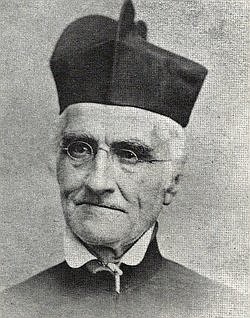The life of Fr. Ferdinand Helias came alive for members of the Historic City of Jefferson several years ago when Latin professor James Farris spoke to the group of his translation of the legendary priest's memoirs. The Jesuit priest served Central Missouri from 1838 until his death in 1873, establishing churches in Westphalia, Washington, Taos, Rich Fountain, St. Thomas, Jefferson City and Boonville.
The legacy of Fr. Helias lives on in our Jefferson City community, as his name is visually evident in the streets and buildings and, most notably, Helias Catholic High School named for him. One of the seven churches he founded was St. Peter Catholic Church. Nearly 170 years later, many of the family names mentioned in the memoirs can still be found in area parishes.
The hand-written Latin memoirs of Fr. Helias had not been previously translated until several years ago when Farris, former Latin teacher at Jefferson City High School and more recently a professor of Latin at Westminster College, received the Helias memoirs with a caveat, a request for an English translation of the work. A passionate enthusiast of all things Classical Roman, Farris set about on the project that would eventually take him 18 months. The 95 legal-size pages were in "almost impenetrable penmanship," scripted in the classical Ciceronian-style Latin. Farris describes once spending 45 minutes to translate just two words that he finally determined meant "prodigal son," a not unusual linguistic undertaking in his project.
In a 2015 interview for a News Tribune article, Farris observed about Fr. Helias: "He had a good sense of humor. You might look at the only picture taken of him and say he looked stern and rigid. From what I read, I know otherwise."
Fr. Helias was born in 1796 of Belgian aristocracy, one of 10 children, who, in his own words, "was my parents' favorite." He joined the Jesuit order in 1810, traveled to New York City in 1833, then on to St. Louis in 1835. He was sent to the village of Westphalia in Osage County in 1838, where he established his first parish, St. Joseph. But his residence in Westphalia was fraught with discord as he noted, "a foreboding air of discord has been arising;" such dissension is confirmed in the memoirs of Henrietta Bruns. This friction came to a head when Fr. Helias compelled Dr. Bernard Bruns, husband of Henrietta, to treat a sick man who was found too poor to pay his doctor bill. Bruns unsuccessfully sued Helias for the $70 cost of the treatment. Helias wrote, "I was strangely amazed to find without provocation that I was constantly persecuted by some dissenting infidels of the malicious Bruns cabal, wounding my reputation by the most ridiculous accusations I was found innocent of concealing traitors, spys (sic), cannons and powder." This last reference is to false accusations that he gave refuge to Confederate spies during the Civil War.
Was Fr. Helias the noble, pious, dedicated Catholic Jesuit priest on a tireless mission to spread Catholicism to early 19th-century central Missouri? Or was he the opinionated, stern and traitorous priest that Henrietta Bruns describes in her memoirs, "Hold Dear As Always:" "He lost the confidence of the people, he scolds, he lies, he argues. One can never go to church without finding some objection to his sermon. If only we had a good German minister." Perhaps the measure of this complex man lies somewhere in between.
After five years at Westphalia, Fr. Helias was transferred to Taos in Cole County. In the last years of his life, he was offered the chance to return to his Belgium homeland; however, he preferred to stay in Taos, the area he grew to love. In 1873, at the age of 78, he died in his beloved Taos and today lies in a crypt in St. Francis Xavier Church. It appears his last words of his memoirs ring true: "I hope that after my death, which is not too far distant, that they will not forget me."
The full transcript of James Farris' translation of the Fr. Helias Memoirs can be found at the Historic City of Jefferson website, historiccityofjefferson.org/resources.
Jenny Smith is a retired chemist with the Highway Patrol Crime Lab and former editor of the Historic City of Jefferson's Yesterday and Today newsletter.

